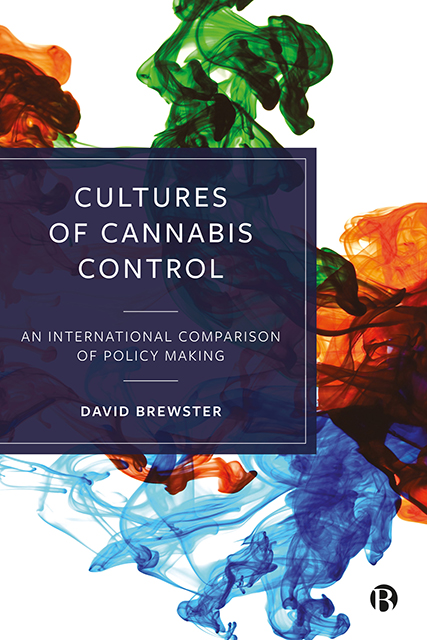Book contents
- Frontmatter
- Contents
- List of Tables
- About the Author
- Acknowledgements
- 1 Introduction
- 2 Cannabis Policy in Global Perspective
- 3 Sociopolitical Change and Cannabis Control
- 4 Problematizing Cannabis
- 5 The ‘Primeval Soup’ of Policy Proposals
- 6 The Political Environment and Windows of Opportunity
- 7 Beyond the National: Policy Negotiation, Resistance and Subversion
- 8 Cultures of Cannabis Control
- 9 Conclusions and Future Directions
- Appendix
- Notes
- References
- Index
8 - Cultures of Cannabis Control
Published online by Cambridge University Press: 16 June 2023
- Frontmatter
- Contents
- List of Tables
- About the Author
- Acknowledgements
- 1 Introduction
- 2 Cannabis Policy in Global Perspective
- 3 Sociopolitical Change and Cannabis Control
- 4 Problematizing Cannabis
- 5 The ‘Primeval Soup’ of Policy Proposals
- 6 The Political Environment and Windows of Opportunity
- 7 Beyond the National: Policy Negotiation, Resistance and Subversion
- 8 Cultures of Cannabis Control
- 9 Conclusions and Future Directions
- Appendix
- Notes
- References
- Index
Summary
Introduction
What are the overall patterns in cannabis policy-making processes, and how can we understand and explain converging and diverging tendencies across different contexts? A key assumption underpinning assertions of a punitive turn in crime control is that late modern globalizing conditions are necessarily accompanied by convergence in issues and representations which are particularly favourable to non-adaptive policy processes.
Certainly, aspects such as technological advances, ease of cross-national movement, rapid knowledge transfer and political insecurity and instability have all contributed to similar shifts in the nature of cannabis-related acts, as well as in the environments in which policy is determined, across a number of contexts. However, what is clear from preceding chapters is that while there are degrees of similarity, there is also considerable variation both cross-nationally and between national and subnational levels of governance.
Through synthesizing the findings of previous chapters, this chapter first discusses policy processes in cannabis control in England & Wales and the Netherlands and then turns to consider what shapes such trends through examining the role of political institutions and relations of power. In each section, broader reflections from the other international cases that have been examined are also considered. In this way, the comparison identifies ways in which policy making is facilitated, resisted or reworked at national and subnational levels, and illuminates the contingently messy configurations of cannabis policy making which give rise to variegated cultures of control.
Policy processes in cannabis control
In the late 2000s, cannabis had taken on a number of shared problematizations across both England & Wales and the Netherlands, particularly in respect of public disorder, organized crime and mental health. In considering why these particular representations prevailed in these contexts, and how they came to be connected to more restrictive policy responses, we have to understand that problem recognition is not simply a reflection of an objective state of affairs, but involves coupling to moral and normative judgements in a vacuum of power struggles. The definition of a problem serves to diagnose and respond to behaviours in a way that accords with belief systems or which justifies further power and control of definition-givers (Freidson, 1970).
- Type
- Chapter
- Information
- Cultures of Cannabis ControlAn International Comparison of Policy Making, pp. 145 - 163Publisher: Bristol University PressPrint publication year: 2022



